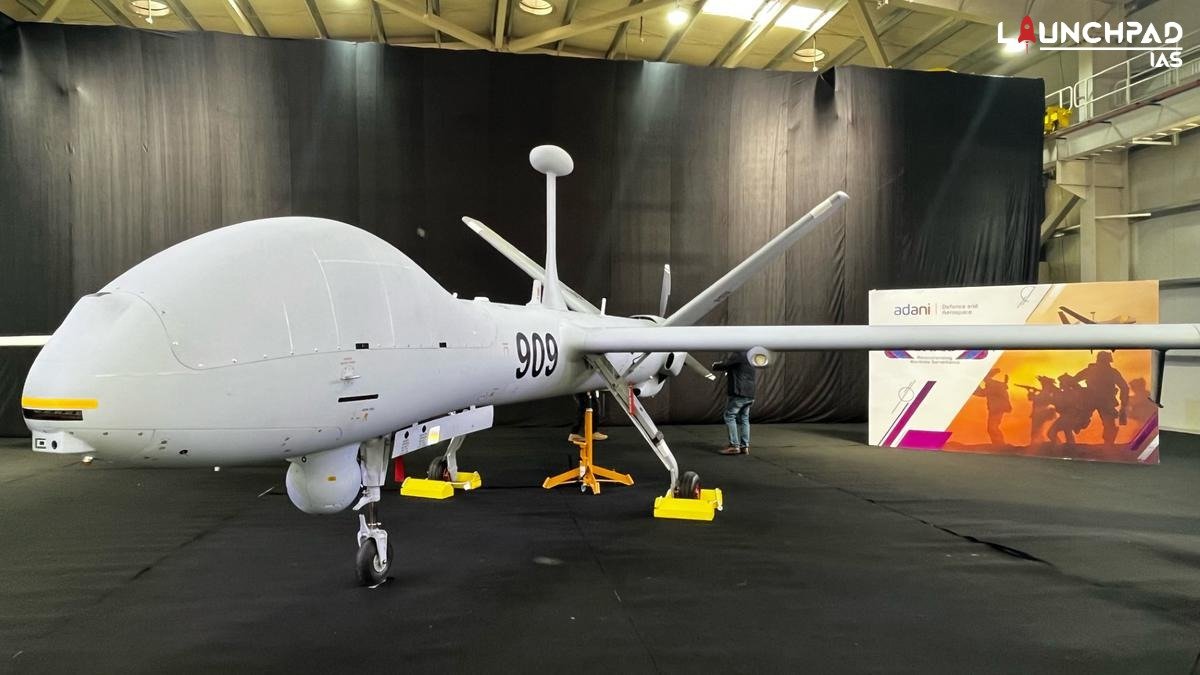Recent context :
Indian Navy has recently acquired Drishti 10 UAV from Adani Defence.
What is a UAV?
A UAV, or Unmanned Aerial Vehicle, is an aircraft that operates without a human pilot onboard. Instead, it is either piloted remotely by a human operator or autonomously through pre-programmed systems or artificial intelligence. UAVs are commonly known as “drones.”
Type of UAVs:
- Fixed-Wing: Resemble airplanes; long flight times; used for surveillance and mapping.
- Multi-Rotor: Have multiple rotors (E.g., quadcopters); great for photography and short-range tasks.
- Single-Rotor: Like helicopters; carry heavier payloads; used for specialized tasks.
- VTOL (Vertical Take-Off and Landing): Combine fixed-wing and rotor features; long endurance with vertical takeoffs/landings.
- Tethered: Connected to a ground station; offers continuous power for persistent tasks.
- Nano/Micro: Small drones for indoor use or tight spaces.
- High Altitude: Operate at great heights; used for weather and surveillance.
- Swarm: Groups of drones working together; used for coordinated displays and research.
UAVs in India:
- During the 1990s, the Indian Army procured unmanned aerial vehicles (UAVs) from Israel, subsequently prompting the Indian Air Force and Navy to adopt similar measures.
- During the 1999 Kargil conflict with Pakistan, India employed military unmanned aerial vehicles (UAVs) to conduct visual reconnaissance activities along the Line of Control (LOC).
- The regulation of all aerial vehicles, whether human or automated, in India is overseen by the Directorate General of Civil Aviation (DGCA).
- Unmanned Aerial Vehicles (UAVs), initially designed for military and aerospace applications, have gained widespread adoption in several sectors due to their notable advancements in safety and efficiency.
Drishti 10 ‘Starliner’:
- It is an indigenously manufactured Unmanned Aerial Vehicle (UAV).
- Adani Defence and Aerospace developed it.
- It is an indigenously built version of the Hermes-900 UAV of the Elbit system of Israel and has 70% indigenous content.
- It is an advanced intelligence, surveillance, and reconnaissance (ISR) platform with 36 hours of endurance and a 450 kg payload capacity.
- It is an all-weather military platform that has clearance to fly in both segregated and unsegregated airspace.
- It is designed to possess high endurance, combat-proven capabilities, and advanced features, providing a significant boost to India’s naval capabilities.
- The UAV’s autonomous nature, mission effectiveness, and payload configuration options make it an invaluable asset for strategic operations.
- One of the distinguishing features of the Drishti 10 ‘Starliner’ is its minimal maintenance requirements, making it cost-effective and operationally efficient.
- This characteristic ensures increased operational readiness, reducing downtime, and maximizing deployment opportunities.
- It has advanced communication systems, including satellite communication and Line-of-Sight (LOS) data links, ensuring reliable and secure data transmission.
Related Links: PRACHAND CHOPPER


